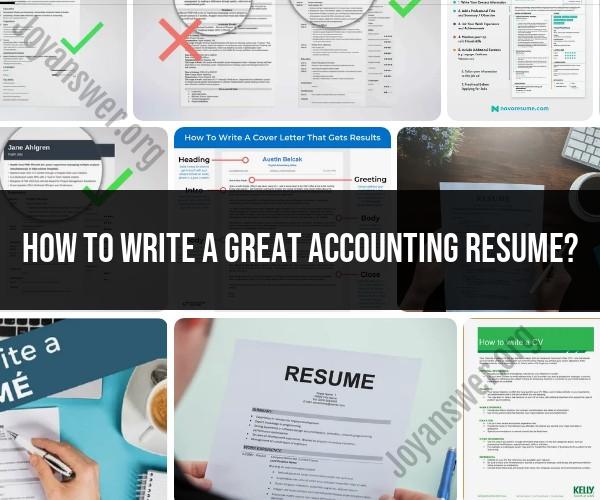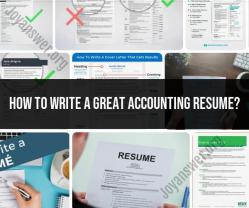How to write a great accounting resume?
Writing an outstanding accounting resume is essential to stand out in a competitive job market. Here are some tips and guidance to help you create a great accounting resume:
Choose the Right Format:
- Use a reverse-chronological format, which lists your most recent experiences first. This is the most common and effective format for accounting resumes.
Contact Information:
- Include your full name, phone number, professional email address, and your LinkedIn profile (if applicable).
Professional Summary or Objective:
- Write a brief, well-crafted summary or objective statement that highlights your career goals, skills, and what you can bring to the position. For example: "Dedicated CPA with 5 years of experience in financial reporting and analysis, seeking to contribute my expertise in a senior accountant role."
Key Skills:
- Create a section for key skills relevant to the accounting field. Mention technical skills, such as proficiency in accounting software, as well as soft skills, like attention to detail and problem-solving abilities.
Work Experience:
- List your relevant work experience in reverse chronological order. For each position, include:
- Job title and the name of the company.
- Dates of employment (month and year).
- Bullet points that highlight your accomplishments and responsibilities. Focus on quantifiable achievements, such as "Managed a team of 3 accountants" or "Reduced accounts payable errors by 20%."
- List your relevant work experience in reverse chronological order. For each position, include:
Education:
- Mention your educational background, including degrees earned, the name of the institution, graduation date, and any relevant certifications (e.g., CPA, CMA, CFA).
Additional Sections:
- Consider adding sections like:
- Certifications: List any relevant certifications and licenses.
- Professional Memberships: Mention any accounting or finance-related organizations you are a part of.
- Awards and Honors: Highlight any accolades or awards received in your career.
- Volunteer Work: Include any accounting-related volunteer experiences or community involvement.
- Consider adding sections like:
Tailor Your Resume:
- Customize your resume for each job application. Highlight the skills and experiences that are most relevant to the specific position you're applying for.
Quantify Your Achievements:
- Use numbers and percentages to demonstrate your impact. For example, "Managed a $2 million budget" or "Reduced financial discrepancies by 15%."
Use Action Verbs:
- Start each bullet point with a strong action verb to make your accomplishments more dynamic. Examples include "Led," "Implemented," "Managed," "Analyzed," and "Audited."
Proofread and Edit:
- Ensure that your resume is error-free. Mistakes can create a negative impression. Consider using a proofreading tool or asking a friend to review it.
Be Concise:
- Keep your resume concise, ideally limited to one page, unless you have extensive experience. Use clear and succinct language.
Include Keywords:
- Incorporate relevant keywords from the job posting to make your resume more appealing to applicant tracking systems (ATS).
Professional Appearance:
- Choose a clean and professional layout with a standard font (e.g., Arial or Times New Roman) and an easily readable font size.
References:
- It's not necessary to include references on your resume. You can provide them upon request.
Create a Cover Letter:
- Write a tailored cover letter to accompany your resume, expressing your interest in the position and how your skills and experience match the job requirements.
Remember that your accounting resume is a reflection of your professionalism and expertise. A well-crafted resume that showcases your skills, accomplishments, and qualifications will help you make a strong impression on potential employers in the accounting field.
How to craft an outstanding accounting resume:
To craft an outstanding accounting resume, you need to highlight your skills, experience, and achievements in a way that is clear, concise, and relevant to the job you are applying for.
Key components of an effective accounting resume:
- Contact information: Include your name, email address, phone number, and mailing address.
- Summary statement: A brief overview of your skills and experience, and what you are looking for in your next role.
- Work experience: List your previous accounting roles in reverse chronological order, including the company name, your job title, and your dates of employment. For each role, highlight your key responsibilities and accomplishments.
- Skills: List your accounting skills, including both hard skills (such as proficiency in accounting software) and soft skills (such as communication and teamwork).
- Education: List your educational background, including the name of the institution, your degree, and your dates of attendance.
Examples of achievements and skills to highlight on an accounting resume:
- Achievements:
- Reduced accounting costs by 10% by implementing a new accounting system.
- Improved the accuracy of financial reporting by 5%.
- Managed a team of 10 accountants and successfully completed a $10 million audit.
- Skills:
- Proficiency in accounting software such as QuickBooks and Excel.
- Experience with financial reporting, budgeting, and forecasting.
- Strong analytical and problem-solving skills.
- Ability to work independently and as part of a team.
- Excellent communication and interpersonal skills.
Importance of tailoring your resume to the accounting job you're applying for:
It is important to tailor your resume to the accounting job you are applying for. This means highlighting the skills and experience that are most relevant to the job, and using keywords that are likely to be used by the hiring manager.
To tailor your resume, carefully read the job description and identify the key skills and experience that the employer is looking for. Then, make sure to highlight those skills and experience on your resume. You can also use keywords from the job description throughout your resume.
How to make your accounting resume stand out to potential employers:
To make your accounting resume stand out to potential employers, you can:
- Use a clear and concise format. Your resume should be easy to read and scannable. Use a simple font and avoid using too much formatting.
- Highlight your most relevant skills and experience. Make sure to highlight the skills and experience that are most relevant to the accounting job you are applying for. You can do this by using bold font, italics, or bullet points.
- Quantify your accomplishments. Whenever possible, quantify your accomplishments. This will help employers to see the impact of your work.
- Use keywords throughout your resume. Use keywords from the job description throughout your resume. This will help your resume to be picked up by applicant tracking systems (ATS).
- Proofread carefully. Make sure to proofread your resume carefully for any errors in grammar or spelling.
By following these tips, you can craft an outstanding accounting resume that will help you to land your dream job.


